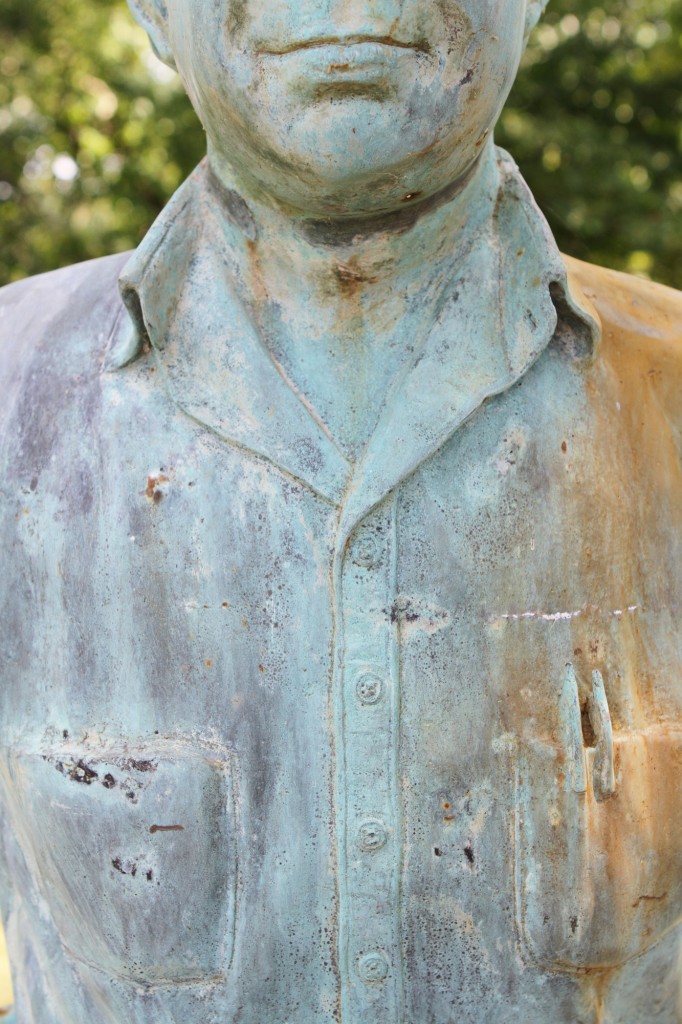
By Jennifer Richardson
My grandfather Woody occasionally picked up hitchhikers. We only knew about it when he mentioned it in passing. He certainly never did it when my sister or I, his only grandchildren, were in the car with him. This is not to say he was overly conservative in our company. A swig from an airline bottle of Smirnoff while driving was on the acceptable end of his personal scale of safety around kids.
Woody would drop news of his latest lift into casual conversation as if it was no big thing, because to him, a child of the Great Depression, it was no big thing. The two defining stories of his personal mythology were both Depression-related and he told the first one with tremendous pleasure at every family gathering. It was the story of how he, along with his parents and siblings—Burl, Vernyl, Leonard, Pauline, and Helen—headed west from Arkansas and the Dust Bowl along a wood plank road in a used hearse. Mistaking them for a funeral procession, other cars on the road would stop, the passengers doffing their caps. The other story is that he picked cherries for a penny a pound when he eventually made it to Redlands, California. He told this story less often and, when he did, there was no nostalgia.
In the intervening years of the mid-twentieth century, he achieved the American dream that still exists today, even if it’s largely unattainable, rising to middle-class wealth as a salesman for the gas company. His childhood of grinding poverty stayed with him, surfacing in the stories, his pleasure in growing his own food in his backyard vegetable garden, and the combination of fearlessness and empathy that occasionally led him to stop and pick up a stranger on the side of the road.
My grandfather’s circumstances when I came to know him were a world away from those when he arrived in the Golden State; my own experience at that age overrode any knowledge I had of his past. That experience, as a child of the eighties, was hysteria over mall kidnappings that had ingrained into me to never get into a car with a stranger. The thought that someone would actively solicit getting into a car with a stranger and that my grandfather might be such a stranger was wildly illicit and dangerous and strange. I wanted to know everything.
I would, however, learn nothing. My grandmother Willie’s dagger-eyed distaste for my grandfather’s disclosures always cut the conversation short. Her reaction was not one of concern for his safety, although that may have been the pretense, but rather a cool disdain for his violation of bourgeois norms. She had also come from severe hardship, first in the panhandle of Texas where the Spanish Flu epidemic of 1918 orphaned her before she was one, then in Oklahoma before finally making it to California. She was a career woman, working her way up to head the San Bernardino County DMV, and, together with my grandfather, had achieved a standard of living that included flocked wallpaper in the guest bathroom and membership at the Arrowhead Country Club. Willie, understandably, had no interest in behavior that lacked alignment with this hard-earned status.
•••
Both my grandparents have been gone for years now, but my husband’s recent foray into driving for Uber reminded me fondly of my grandfather’s predilection for providing transport to strangers. When Doug first broached the idea about a year ago, I reflexively resisted. Surely our insurance wouldn’t cover it—a drunk person would vomit in the car, think of the wear and tear! Hiding just under the surface of my purposefully reasonable objections was a smidgen of my grandmother. My protests turned out to be unnecessary. Our 2004 Volvo was too old to meet Uber’s standards.
This was not the first time my own bourgeois hang-ups had led to discomfort about my husband’s job. Early in our marriage, after a decade working in the entertainment industry and the heady early days of the internet, he had turned down a non-optional work transfer to Dulles, Virginia so that we could stay in Los Angeles. In the aftermath of that decision, he bobbed around some start-ups before landing part-time work at Los Angeles International Airport, employed by an acquaintance who had a contract to maintain the airport police’s computer systems. One of his jobs was cleaning out the keyboards in airport police cars. He had no qualms about his menial tasks, although he did find the depth of seriousness exhibited by one of his colleagues amusing. This colleague, who had been charged with training my husband on his first day, had presented him with a PowerPoint in which he declared with characteristic post-9/11 American earnestness, that, armed with tiny canisters of compressed air, their mission was to “save lives.”
We bonded over this joke, but the subtext for me was that he was working with losers and, well, you are who you surround yourself with. To put it another way, at this point in my life I was unclear on the distinction between who you are and what you do for work. (Fifteen years later, it’s something I’m still teasing out.) My husband seemed less concerned about the potential for disastrous Svengali-ism at the hands of Mr. Saves Lives. In fact, he was downright relaxed. Much to my annoyance, I often found him in a state of repose on our couch when I arrived home from work. He had been in full-time employment since he was seventeen, he occasionally reminded me. He deserved a nap.
•••
Late last year Uber relaxed their rules and our old Volvo, affectionately known as Virginia, was in. Deterred by my earlier reaction, Doug didn’t tell me about his first drive until after it was done. He need not have been concerned. My qualms had subsided, which I attribute in part to the life-changing magic of not giving a fuck—to borrow the title of a bestseller—that comes with every hard-won year of my middle-age. My ease was also a product of our financial security relative to the position we had been in when my husband worked at the airport. This time we didn’t need the money, a fact that served as a psychological buffer. It was an updated version of my grandmother’s flocked bathroom wallpaper, only this time it gave license to take the stance opposite of hers. She and I were two generations apart, bonded by our adherence to two sides of the same snobby coin.
It also helps that Doug dabbles in other more conventionally middle-class pursuits, most recently interning as a marriage and family therapist. He’s a Gen-Xer, but he has a millennial’s predilection for the gig economy which is handy, since apparently, we’re all going to be working multiple part-time jobs till we die. In addition to Uber and the intern hours working towards the therapist license, he does freelance project management and offers his services as a pet-sitter on Rover.com. Sometimes the dog he watches semi-regularly, a pit bull/Australian cattle dog mix, comes along with him when he drives Uber, which has gone down surprisingly well with his customers. I think there’s more potential synergy to tap between my husband’s varied vocations: micro-therapy sessions for the length of your ride, uberPOOL as group therapy.
After all, people love to talk in an Uber. (I know, I’m one of those folks recently lampooned on SNL who always asks my Uber driver how long he or she’s been doing it.) The company may go down in history as the poster child of the on-demand economy, but that is missing the more interesting sociological point. Uber may be a smartphone app, but the experience it facilitates feels like one of the last places left where strangers still speak to each other. I’ve never been on either side of the hitchhiking equation, but I imagine the dynamic, assuming nobody is committing murder, is more akin to Uber than cab.
In just two weeks, my husband’s Uber stories top anything I’ve heard at the corporate watercooler in twenty years. His first passenger’s boyfriend packed parachutes for people about to skydive solo for the first time, a stranger’s life literally in his hands. His second was a neurosurgeon from Ecuador who lives in North Carolina, with whom he discussed the convergence of psychology and neuroscience. Then there was the wheel-chair bound young man who declined assistance as he folded up his chair, explaining that six months earlier the hydraulic lift had broken while he was working on his car, paralyzing him from the waist down. In Santa Barbara, a Manhattan couple got a ride to an anti-Trump party in a mansion in Montecito. On inauguration day, a military man on his way to Port Hueneme explained he would be watching the ceremony because “I voted for him.” That afternoon two gay Latino brothers, both high as kites, got a lift to the TGI Fridays in Oxnard to meet up for drinks with friends.
My husband claims the part of Uber he finds most interesting is the technology, fascinated by the algorithms of supply and demand. But every day that he drives he tells me his best stories with obvious relish, and I listen to these tales of strangers with vicarious delight. These are the stories I never got to hear from my grandfather, the ones he took to his grave.
•••
JENNIFER RICHARDSON is the author of a memoir, Americashire: A Field Guide to a Marriage. Her husband now drives for Lyft, and she’s yet to convince him to pick up a hitchhiker. Find her online at http://jenniferrichardson.net/ and on Twitter @baronessbarren.

 Follow
Follow




